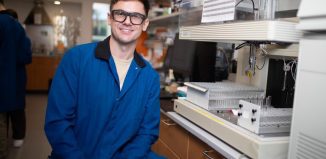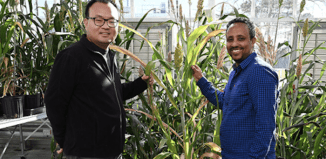Exposing dangers of potent carcinogen
In Taiwan and Balkan countries, Arthur Grollman has seen first hand how Aristolochia, a popular ingredient in herbal remedies, can be anything but helpful.
The plant, which includes over 800 species, was a part of herbal medicine in ancient Greece and Rome, where it was used to expel the placenta. It has also been a remedy for gout, arthritis, stomach pain and female disorders. Called birthwort in herbal remedies, Aristolochia grows in temperate climates throughout the world.
“This is the most potent human carcinogen ever reported,” said Grollman, distinguished professor in pharmacological sciences at Stony Brook and the Evelyn Glick Professor of Experimental Medicine. Aristolochia causes chronic kidney disease and, over time, also causes urothelial cancers of the upper urinary tract. Symptoms of cancers of the urothelium, which lines the renal pelvis and the upper ureter, often include bleeding.
“If [a patient] comes in with bleeding, doctors can do the appropriate X-ray and see a tumor and remove the single kidney,” he said. The carcinogenic properties of the plant, however, are unlikely confined to one kidney. “What usually happens,” he said, “is anywhere from one to five years later, the other kidney develops it.”
The United States, most European countries and many Asian countries have banned importation of any Aristolochia herb. Consumer Reports put it at the top of their list of dangerous herbs sold as dietary supplements.
Grollman has been “involved in integrating much of this” research, said Francis Johnson, a professor in pharmacological sciences at Stony Brook, who has known Grollman since 1965. Grollman is a researcher who “can take a bird’s-eye view.”
In 2004, Grollman went to the Balkans with his wife Annette, where he spoke with farmers in a dialysis clinic through an interpreter about whether they took herbal remedies. The farmers insisted they hadn’t consumed them. Still, while he was there, he went to a library, where he found an article in German that indicated that horses in the area that had ingested Aristolochia weeds also had kidney problems.
Grollman traveled with one of the farmers to his farm, where he noticed Aristolochia growing in the wheat fields.
Grollman deduced later on that seeds from Aristolochia contaminated the wheat. A staple of the diet of many farmers in these villages, bread contains wheat which, in this case, also had toxic seeds. Over time, “only a few seeds was enough” to damage their kidneys since the toxin/carcinogen binds to DNA in renal and urothelial tissue and remains there for many years.
He held his first symposium on the subject in 2007. Most of the scientists believed the data, but the public had heard before about possible causes of the disease, called Balkan endemic nephropathy, that didn’t work out and remained skeptical.
One of the biggest challenges in sharing his lab’s conclusion about BEN was that the country had just gone through a civil war, which minimized cooperation among Bosnians, Serbians and Croatians. He arranged a scientific conference in each capital city, showing results of studies from their own country.
Grollman has been “very much involved in the epidemiology, the biochemistry and biology of this situation,” said Johnson. In Asia, herbal remedies that include Aristolochia have been a part of Chinese herbal medicines for 2,000 years.
Except for a few scientists, the Asian communities were “very skeptical” of the dangers of Aristolochia at first. Based on the frequency of use of this plant as a part of herbal remedies, there could be as many as 100 million people in China suffering from kidney problems, Grollman estimates.
In his own lab, Grollman discovered a genetic fingerprint in a tumor suppressor gene that shows exposure to Aristolochia. The next step, he said, is to develop a cost-effective test that will show not only who has taken it but who is at risk of developing health problems as a result.
A resident of Setauket, Grollman, who is traveling in Taiwan this week as one of the main outside speakers in a symposium on cancer in Taiwan, said he has a keen appreciation for Long Island each time he travels.
“Wherever I go in the world, when I come back, I know I’m living in a great place,” he said. That’s helped over the years because it’s “awfully easy to recruit faculty to Stony Brook.”






